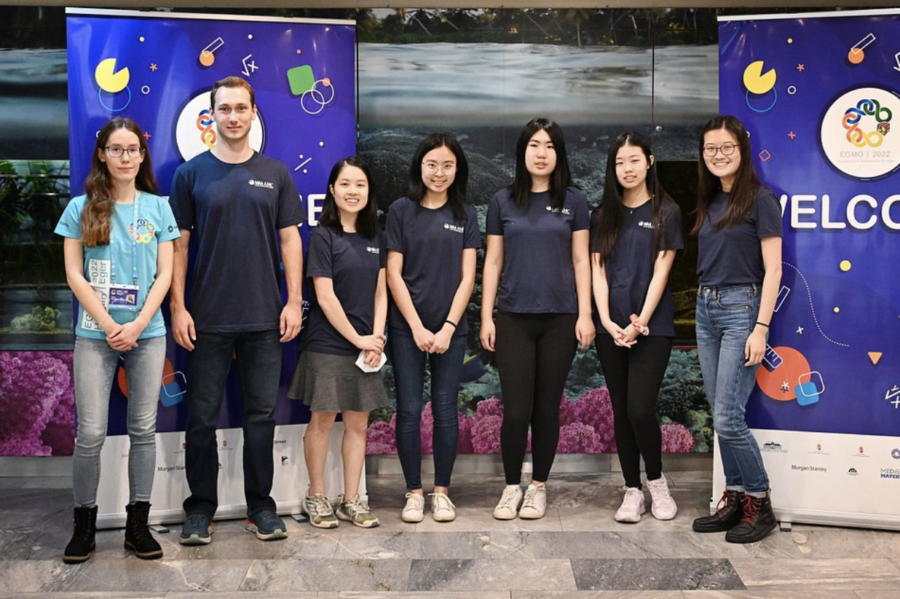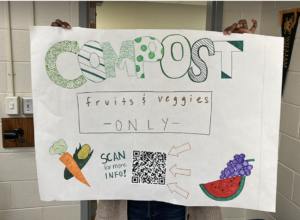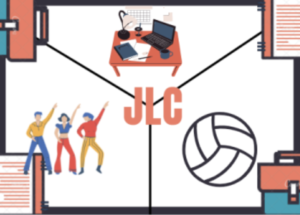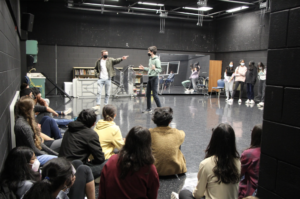The road to olympiad gold
Junior Isabella Zhu wins a gold medal at the 2022 European Girls’ Math Olympiad.
Mathematical Association of America
Junior Isabella Zhu (fourth from the left) poses for a team picture with the other members of the 2022 USA European Girls’ Math Olympiad team. “I loved spending time with my teammates, and I also got to meet a bunch of girls from different countries, which was really fun,” Zhu said.
April 24, 2022
Imagine the Olympics, but instead of athletes, it’s a battle between mathletes. Every year, the European Girls Math Olympiad (EGMO) brings together over 200 of the world’s best female high school math students for an international competition. This year, the EGMO took place in Eger, Hungary from April 6 to April 12.
Junior Isabella Zhu was one of four students that represented the United States at the 2022 EGMO. Zhu placed fourth individually, earning her a gold medal. Her performance contributed to the United States’ first-place win out of over 50 participating countries.
“I definitely did not expect to get such a high placement like fourth place, which is amazing,” Zhu said. “I think that our team also did really well. Team USA got first, which is also really incredible.”
Zhu’s journey to the EGMO began in elementary school, where she first became involved with the American Mathematics Competition (AMC). Zhu found the problems intriguing and continued to pursue competition math throughout middle and high school.
“I started doing the AMC competitions in sixth grade. I really liked it because it was different from what I learned in school and was actually challenging,” Zhu said. “After that, I just got really into competition math.”
Since sixth grade, Zhu has accumulated numerous accomplishments in math. This year, she was one of the top five female scorers on the AMC 12 B. Zhu’s performance earned her the 2022 Akami AMC 12 B Award, which includes a monetary prize of $1,000. Zhu is also an active member of the Varsity Math Team and has represented Jefferson at many competitions. This year, she placed fifth individually at both the Harvard-MIT Mathematics Tournament and the Princeton University Mathematics Competition.
Zhu’s math abilities also allowed her to represent the United States at this year’s EGMO. Making the EGMO team is already an incredible achievement due to the long and intense olympiad selection process. Students must first qualify for the Math Olympiad Program (MOP) by scoring well on either the USA Junior Math Olympiad or the USA Math Olympiad. The MOP takes place in the summer, and during the winter after MOP, students take a series of Team Selections Tests (TSTs). Scores on these tests determine the teams for international olympiads, such as the EGMO.
“I was really excited when I found out that I had made the EGMO team,” Zhu said. “This has always been something I wanted to do, so I went out and celebrated.”
The EGMO is a proof-based competition that takes place over two consecutive days, with each day consisting of three problems in 4.5 hours. Each problem is worth seven points, for a total possible score of 42 points. The EGMO is very challenging, with this year’s competition only having an average score of about 15 points.
“To prepare, I did all of the past problems from EGMO. There were ten years in total, so I worked through all of that in two weeks,” Zhu said.
Zhu’s hard work paid off, and she achieved an impressive 37 points on the EGMO. Her score helped the United States win first place for the second time ever. Along with the actual competition, Zhu also enjoyed becoming closer with her team members.
“I loved EGMO, and it was such an amazing experience. I loved traveling with my teammates since the long plane ride was fun. We also got to stay in a hotel for a week without our parents, so that was really fun,” Zhu said.
Other teams also came to Hungary to compete at the EGMO, so Zhu had the opportunity to interact with students from all over the world.
“EGMO was in-person, which is pretty rare because of COVID. It was also an international competition, which was nice since I got to meet a really broad range of people,” Zhu said.
Although Zhu enjoyed the EGMO immensely, she acknowledges that her experiences with competition math have not always been as successful. Zhu especially struggles with the disappointment she gets after not performing her best, but she tries to push through these negative feelings and move on to the next competition.
“Dealing with failure is probably one of the biggest challenges of competition math,” Zhu said. “Whenever I don’t do as well as I hope, I feel bad about myself. However, I just have to keep going and be determined.”
Despite these occasional defeats, Zhu remains passionate about math and encourages anyone interested to try out math competitions.
“I would tell younger students to be confident in themselves,” Zhu said. “If they work hard, then their skills will improve, so they should just keep going with math.”











